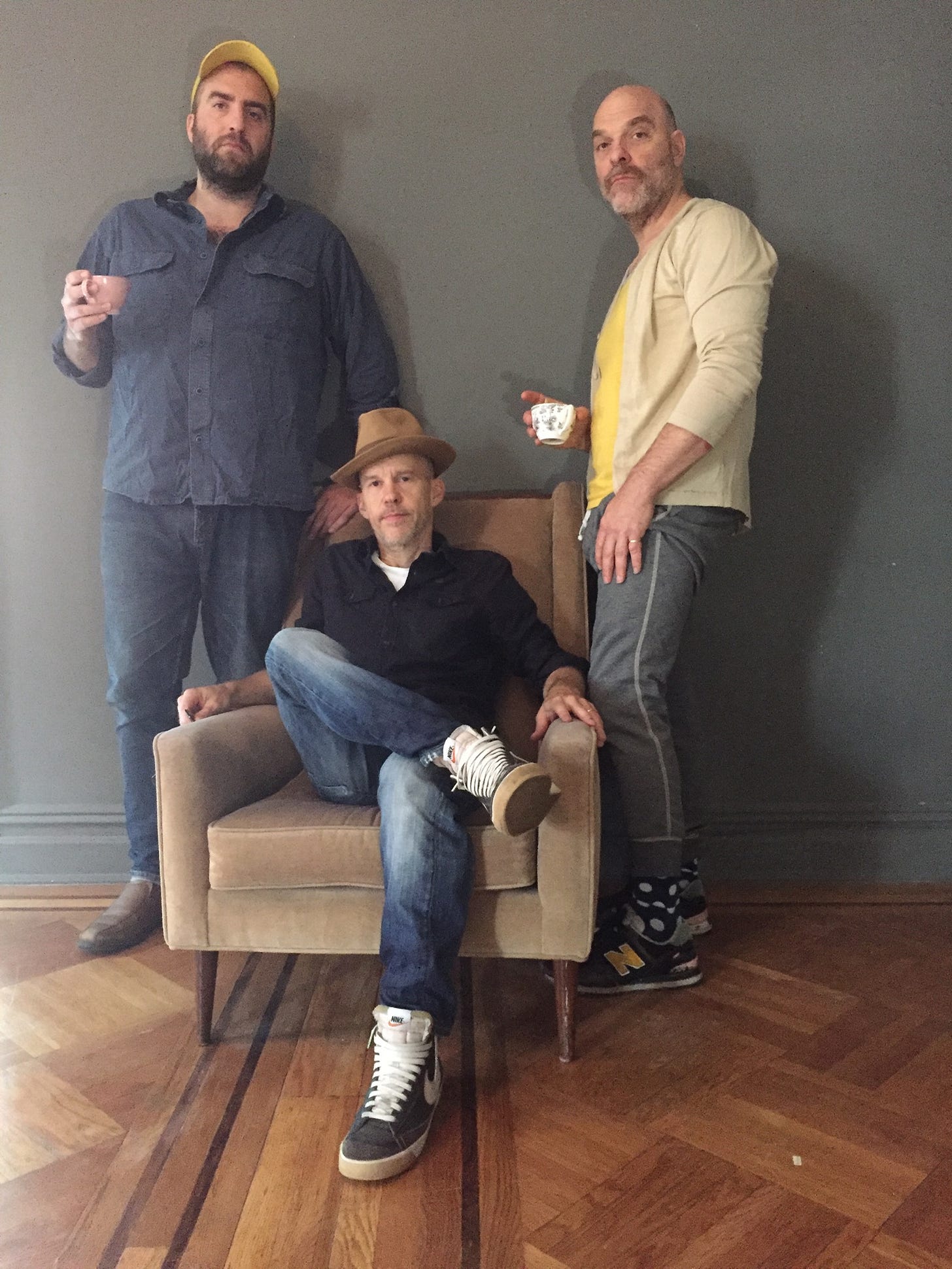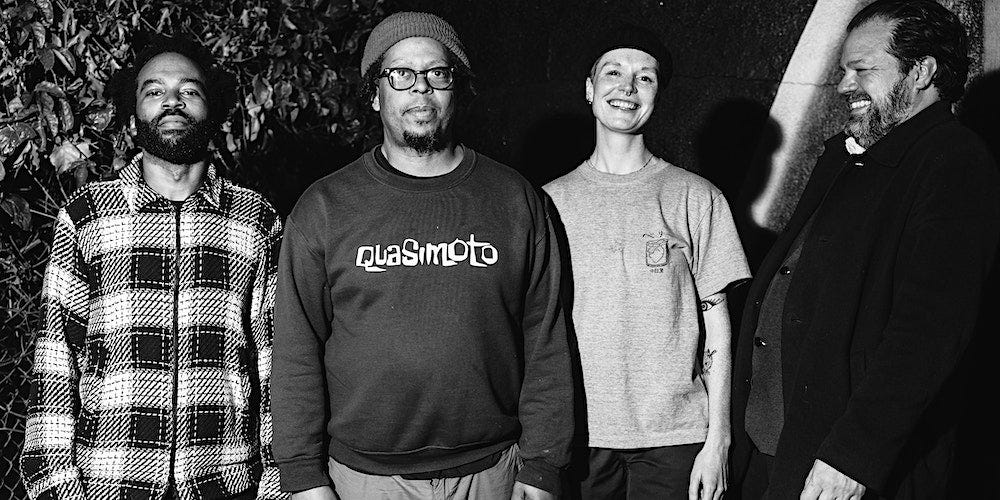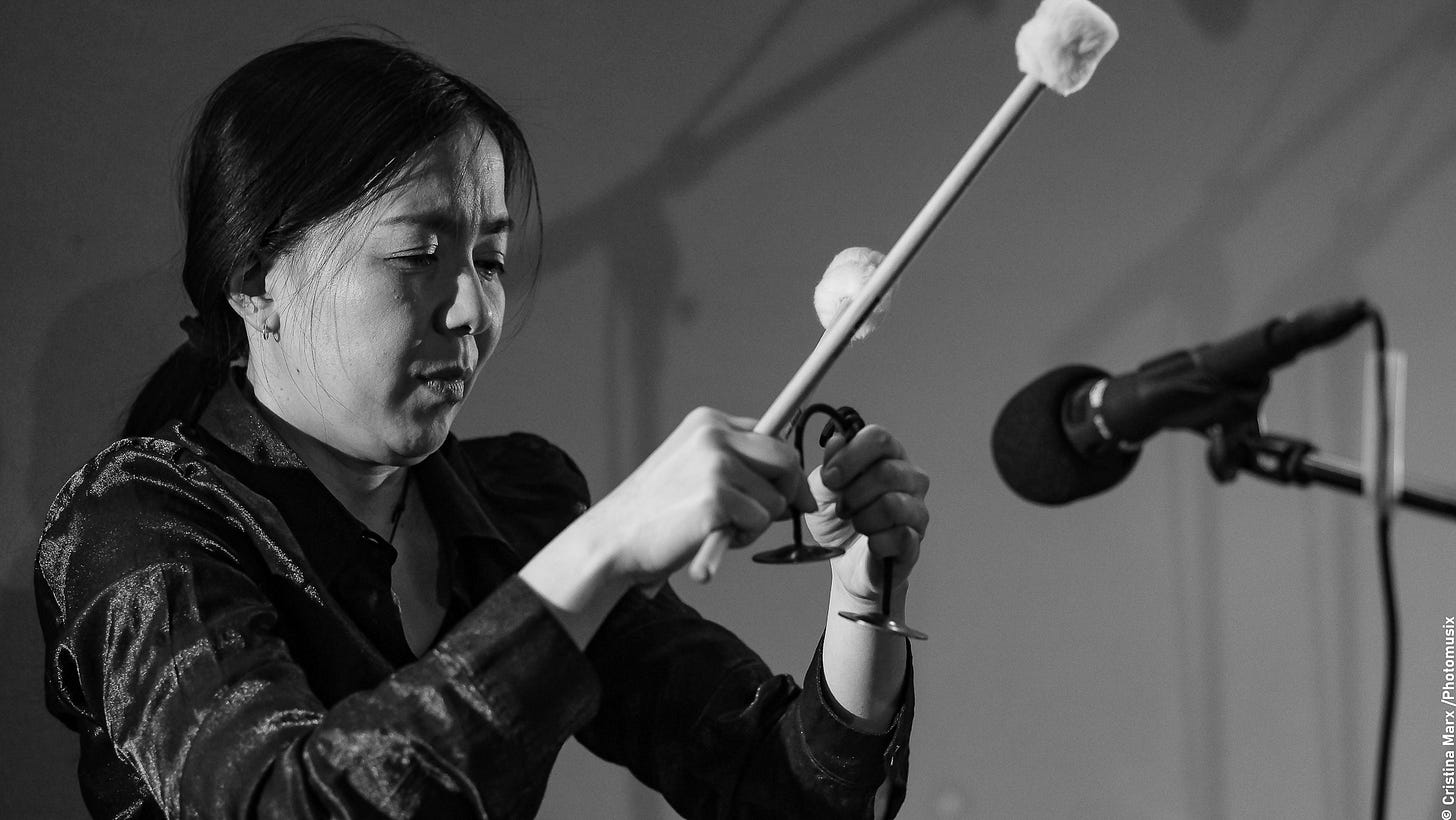Swinging and sliding in Berlin
Chris Speed Trio, Jeff Parker ETA IVtet, Yannick Guédon, Johannes Fink, Taiko Saito
The Chris Speed Trio leans in
Chris Speed has long been one of my favorite reedists in jazz and improvised music, a musician who has simultaneously embraced new sounds and forged novel hybrids—particularly in his group Yeah No—while hewing to the fundamentals of jazz tradition that have made it such a malleable, ever-evolving form. He’s always been an excellent, versatile sideman, elevating just about everything he’s involved in, but no single group of his has provided such sustained, unalloyed pleasure for me like his decade-old trio with drummer Dave King—who works with the reedist in the revamped Bad Plus and his own Dave King Trucking Company—and bassist Chris Tordini. I had the honor of writing a liner note essay for the trio’s third album Respect for Your Toughness back in 2019, and four years later the trio has finally reconvened in the studio to make Despite Obstacles (released, like its two predecessors, on Intakt). The group has never sounded more focused and at ease, reveling in a concision boosted by a refined sense of collective intuition. Straight out of the gate on “Advil,” which you can hear below, the trio balances Speed’s luxuriously velvety, post-Lester Young tenor sound with the livewire energy and charged prodding of King’s detailed, splintery grooves. Tordini holds down a hefty low-end, contributing wood double stops on the theme, and opening up as Speed slowly untethers his playing from the elegant theme.
In his typically erudite, sharply observed liner note essay Kevin Whitehead highlights the fact that all but two of the seven pieces jump right into the theme, underlining Speed’s directness. His tone on both tenor and clarinet feels kaleidoscopic in its range, gravitating toward a plush, translucent splendor that seems to mirror the way the veneer of his 1929 Conn saxophone has achieved a patina that can only arise over time. “Uncomfortable Truths” is relaxed on the surface, but as King spreads out the groove, embroidering his cymbal play with warped metallic whooshes or his toms with muted tonal smears, Speed digs into the plaintive melody with inexhaustible invention, discovering one new melodic wrinkle after another. The trio has nothing to prove at this point, and Speed has never opted for flash or gimmickry. There’s nothing glib or phoned-in here—this is music making of the highest level, establishing the leader’s inherent soulfulness.
Although Speed now lives in Los Angeles, his connection to New York endures, a reality evinced through the lyric tenderness that characterizes “Sunset Park in July,” a sequel to his ravishing ballad “Red Hook Nights,” from the trio’s second album Platinum on Top. The performance levitates, with Speed exploring gorgeously sumptuous tonal variations in which his breath reshapes each pitch, with air occasionally spilling out of the horn like a phantom. Tordini is a secret weapon throughout, his rich, mahogany tone bridging the leader’s tuneful reserve and the drummer’s mischievous disruptions. The music imparts an elegant modesty in its restraint and precision—qualities that don’t usually garner much attention in the jazz media these days—but few recordings this year have proven so deeply satisfying and inspiring.
Jeff Paker’s ETA IVtet descend on Berlin
Few albums brought me more pleasure in 2022 than Mondays at the Enfield Tennis Academy (Eremite/Aguire), a double album that captured the first recorded transmission of the nimble quartet guitarist Jeff Parker convenes each week when he’s in town. Joined by reedist/keyboardist Josh Johnson—a former Chicagoan who’s also a key part of the guitarist’s New Breed band—bassist Anna Butterss, and drummer Jay Bellerose, known best as a roots music specialist for his work with T-Bone Burnett and Joe Henry. As heard on that sleek recording, the band unspools extended groove-driven improvisations that generally maintain a hypnotic, head-nodding simmer. The group sculpts a series of melodic shards, licks, and counterpoint in endlessly morphing patterns. Parker and Johnson are the main soloists, but the rhythm section is just as crucial, with Butterss laying down deep, woody ostinato lines that masterfully carve out space, interjecting silent gaps and meticulously pitched filigree in equal measure. Bellerose sticks with feel-good grooves, operating almost like a drum machine, but shaking things up with sudden accents or displacements, only to snap back into place without a blink. You can check out the album’s second track “2019-07-08,” named for the date it was played, below.
Parker has been one of my favorite musicians for decades and I miss getting to hear him in Chicago, where he played often and in countless contexts. He’s an incredibly versatile player with broad interests, always devoted to ensemble interplay more than grandstanding. This particular quartet brings together so many of his interests in a new way, and I’m super excited to finally hear the group live, when it performs in Berlin Wednesday night at Aeden. Unfortunately, Bellerose isn’t on the tour, but the good news is that Mikel Patrick Avery—a fixture in Joshua Abrams’ Natural Information Society and a drummer of immaculate taste—is filling the chair.
Fink 70s Revisited chills out
I first encountered 5-string cellist Johannes Fink on a trip to Berlin before we moved here. On a blustery night in January of 2018 we were looking to grab a drink, and we chose a bar after noticing a cellist setting up in the oddly named spot, Ick koof mir Dave Lombardo wenn ick reich bin (translation: “when I’m rich, I’ll buy Dave Lombardo”). Soon I discovered that the band we were about to see also included clarinetist Rudi Mahall. Moving to Berlin seemed like the most obvious thing to do ever. Fink doubled as a bassist, laying down easy vamps and dropping in some nice solos. I wish I could remember who else was in the band that evening.
Fink is also a crucial part of Silke Eberhard’s great Potsa Lotsa XL, my favorite large band in Germany. I don’t know the cellist personally, but he’s always seemed to have a wry sense of humor, an observation reinforced by a thoroughly enjoyable new recording from his trio Fink 70s Revisited, Sound of Music (Jazzwerkstatt). The group, which also includes reedist Eberhard and drummer Tilo Weber, is adorned mostly in polyester duds from the 1970s, with a time-specific orange/brown color scheme, in the album art. Looks aside, this isn’t a novelty band.
Luckily, the music isn’t particularly rooted in any point in time, and apart from genre-driven tunes like the bossa-flavored “Muscatel de Setubal,” which you can hear below, or the cool jazz vibe of “Misteriöser”—haunted by the ghost of Fred Katz’s work with Chico Hamilton—it feels thoroughly contemporary, bringing out the most melody-forward, gently swinging side of the players. I suppose the strongest connection to the 1970s is the group’s devotion to pleasure. The group’s theme song “70s Revisited” employs a creeping funk groove that recalls some James “Blood” Ulmer/Ronald Shannon Jackson hybrid, but the music’s edge has been glossily polished. Still, that doesn’t prevent Eberhard from taking a ripping solo. The music—written by the leader apart from a pair of collective pieces—moves briskly, lightly effervescent and tangy, and while there’s plenty of charged interplay, such as the buoyantly tangled lines in the halting “Speaking Birds,” this isn’t a group intent on tearing things down. They want to please, but on their own terms. The trio plays at Jasper’s Mitte on Sunday, July 2 at 8 PM, part of Jazzwoche festivities.
Éliane Radigue’s Occam on the Spree
The good folks behind Sacred Realism are presenting the last official event iteration of “Spiral Sunday” of the year at Petersburg Art Space on Sunday, July 2. I sure hope they add some “unofficial” concerts later in 2023, but in either case this closing show is a gem. I don’t know anything about the Mexican headliner Rolando Hernández, who performs “Maquina de Infatuaciones,” described as “Small Suite for Keymonica, breathing and video, but I’m super psyched to hear a pair of Eliane Radigue pieces from the Occam series. Catherine Lamb will perform Occam XII, a 2017 solo viola work that hasn’t been released as a recording, and which I’ve never heard.
But I have heard Occam XXII, a solo voice piece created for French singer Yannick Guédon. It appears on Occam Ocean 4 (Shiiin), where he also participates in a trio piece with saxophonist Bertrand Gauget and clarinetist Carol Robinson, Occam Delta XIX. On the trio piece his voice seems more abstract, an unidentifiable source that engages in a remarkable dance with the two reeds. The solo piece is more challenging, with nothing to tune against and no one to blend with. Guédon, who is a member of the superb Dedalus Ensemble, is also an emerging composer, who released a lovely work with Dedalus collaborators cellist Deborah Walker and violist Cyprien Busolini called L’Insistance des Possibles (Edition Wandelweiser) in 2020, but here he unveils something else altogether. As with so many of Radigue’s pieces, Occam XXII is a rigorous, mesmerizing sound study where a tone’s constituent parts are patiently, beautifully teased out as smaller components. Over time more ethereal long tones turn nasal, with a piercing quality that uses the same sort of techniques heard in Tuvan overtone singing, where whistle-like layers shadow a more explicit vocal quality. Unfortunately, the piece isn’t available on either Bandcamp or youtube, but you can seek it out on Spotify if you’re interested.
Taiko Saito stretches out
Fink isn’t the only musician I’ve discovered through Silke Eberhard projects. I also heard tuned percussion specialist Taiko Saito through her membership in Potsa Lotsa XL, but it’s only recently I’ve heard her own music. A couple of years ago she made a duo album with the prolific Japanese pianist Satoka Fujii under the name Futari, but I much prefer to pair of albums she’s dropped this year on the Berlin label Trouble in the East, which is operated by yet another figure in Eberhard’s music, the trombonist Gerhard Gschlößl. Saito moved to Berlin from her native Japan back in 1997 to study with David Friedman, and she’s remained here ever since.
Back in April she dropped a solo album called Tears of a Cloud where she privileges marimba over vibraphone on an array of mostly improvised pieces. Her marimba playing evokes a lot of ideas and approaches I associate more with new music than jazz, particularly her dry tone, a huge dynamic range that includes generous stretches of silence, and sonic research that extends to constructing her own mallets. There are bits of cycling riffs on a piece like “Sound Gradation” that evoke certain qualities of Steve Reich’s music, but Saito has her own set of concerns and interests, even when she’s improvising. In her liner notes she explains that in this particular piece she sought to highlight the resonances that emerge when specific patterns are repeated in quick proximity, the peculiar tone colors that are evoked by different mallets within a given set, and the variations produced by how intervals are voiced by the four sticks. If you listen the piece, below, you can hear Saito’s music isn’t weighed down at all by such theoretical interests. These procedures aren’t some kind of speculative research, but a decision she already knew that would make for a gripping, shape-shifting performance.
Her piece “Underground” is decidedly more experimental, as super quiet swells of low-end sound rise up with impressive liquidity only to recede into bass-heavy overtones ringing out from more percussive one-handed gestures. With her other hand Saito uses a bass bow to generate those fluid, spooky sounds, made all the more powerful by how hushed the din remains, loaded with portent. She generally eschews anything groove-oriented, instead emphasizing the physicality of sound, triumphantly slipping between all kinds of stylistic cracks.
On Sunday, July 2 she’ll play a solo piece as part of a concert at the spectacular Kaiser-Wilhelm-Gedächtniskirche, where the bulk of the program will feature her excellent improvising trio WALD, with bassist Jan Roder and drummer Michael Griener—the current rhythm section of Die Enttäuschung. The group has just released its eponymous debut recording, made live at the sorely missed Au Topsi Pohl in November of 2021. The album demonstrates an impressive connection on four pieces created on the spot. Saito sticks exclusively to vibraphone here, but her versatility and non-jazz ideas give the music plenty of spark. The rhythm section allows the music to breathe, toggling between swinging passages and sections that focus on pure sound. On the opening track “Ghosts of the Midnight Wood,” which you can listen to below, the music keeps contracting and expanding—players drop out, letting someone pursue an individual thread for a couple of minutes, before the others join back in, pushing the performance in a new direction. Griener is propulsive, but he still attacks his crash cymbal here and there to inject shots of dissonance and chaos, adding delicious tension to already jagged lines unspooled by Saito.
Unlike many other vibists, who produce liquid swells to erase any silence or to generate harmonic possibilities for her cohorts, Saito generally adopts a more percussive attack, which fits perfectly with Griener and the more pointillistic side of Roder’s playing. Elsewhere, as on a piece like “Hoarfrost Tree'' there's an enhanced focus on sound, as bowed lines from the musicians mewl, rumble, and vibrate in striated layers of quietude at the outset, carrying on for more than three minutes before the temperature is raised and the levitating intensity ramps up. I honestly haven’t really heard a vibraphone trio operate like this one does.
Saito will receive the 2023 Berlin Jazz Prize the following evening, July 3, during a live ceremony and performance in “Studio 14,” the rooftop lounge of RBB (Der Rundfunk Berlin-Brandenburg), at 8 PM.
Recommended concerts in Berlin this week
June 27: Orchestra Baobab, 8:30 PM, Gretchen, Obentrautstr. 19-21, 10963 Berlin
June 28: Jeff Parker ETA IVtet, 9 PM, Aeden, Schleusenufer 3, 10997 Berlin
June 29: Christian Marien Quartett with Toby Delius, Jasper Stadhouders and Antonio Borghini, 7:00 PM, Musikinstrumenten-Museum, Tiergartenstraße 1, 10785 Berlin (Curt-Sachs-Saal)
June 29: Rieko Okuda/Matthias Müller/Sam Hall, Céline Voccia/Anna Kaluza/Matthias Bauer, 9 PM, B-Flat, Dircksenstraße 40, 10178 Berlin
June 30: Schneider TM, crys cole, 8 PM, Ausland, Lychener Str. 60, 10437 Berlin
July 1: Joe Hertenstein Trio with Phil Donkin and Michaël Attias, Peppi Gugenheim, Weichselstrasse 7, 12043 Berlin
July 2: Taiko Saito & WALD, 8 PM, Kaiser-Wilhelm-Gedächtniskirche, Breitscheidplatz, 10789, Berlin
July 2: Christian Kesten, 4 PM, Satellit, Weinstraße 11, 10249 Berlin
July 2: Fink 70s Revisited, 8 PM, Jasper’s Mitte, Anklamer Strasse 27, 10115 Berlin
July 2: Takako Suzuki & Bryan Eubanks, Rolando Hernández, Catherine Lamb, Yannick Guédon, 7 PM, Petersburg Art Space, Kaiserin-Augusta-Allee 101, 10553 Berlin






